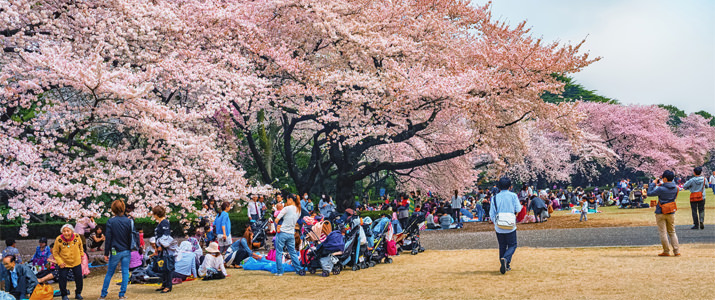The tradition of Hanami in Japan takes place during the blooming of the cherry blossoms. It is customary to find a place under a row of cherry blossom trees to have a Japanese style picnic with family, colleagues, and friends. If the cherry blossom are in full bloom on a weekday, a company might send someone out at the beginning of the day to reserve the best spots, for everyone to gather under in the evening. The cherry blossoms represent the impermanence of time and life, and are a reminder for us to enjoy the beauty in the moment.
While the cherry blossoms remind us to embrace each moment of life, there cherry blossom viewing is a celebration with good food and drink. Much like many Japanese celebrations, it’s been customary for the Hanami to include Japanese style cuisine, games, and drinking. Recently, there seems to be an emphasis in implementing good etiquette and manners for everyone to enjoy the atmosphere. As a result, some parks have been designated “dry zones” where alcohol is prohibited. Some areas have also designated bbq areas, so that the smoke and charcoal are better contained.
A few other good manners to keep in mind:
- Don’t touch the cherry blossom tree or branches
- Stay on the sidewalks and don’t cross over even low fences
- Keep shoes off the tarp and sitting area
- Bring food for yourself and to share with others
- Clean up and take your trash home
In the last decade, the Hanami tradition has spread across seas and has become a time when there are visitors from all over the world to embrace an authentic hanami tradition in Japan. While most of Japan’s good etiquette and manners were “unspoken” or “assumed universal” visitors who broke the rules didn’t know what they were doing wrong. As a result, a movement to educate and make others aware of Japanese manners seems to be in effect. While it isn’t technically illegal to do any of the above, there is an act of self policing that takes place among Japanese people. Some might advise visitors of the rules (knowing that you didn’t know better), but others just might consider the act disrespectful or lacking consideration for others.
While the hanami tradition is a good reminder of the impermanence of life and the events we experience, it is also a reminder that good manners originate from the idea of taking others into consideration. How could my excessive drinking affect others? How will others enjoy the same spot if I leave trash behind? If I shake the branch to get a good cherry blossom storm selfie, how will others that come after me appreciate the flower? Japanese manners exist with the idea of remembering others and therefore act accordingly.
